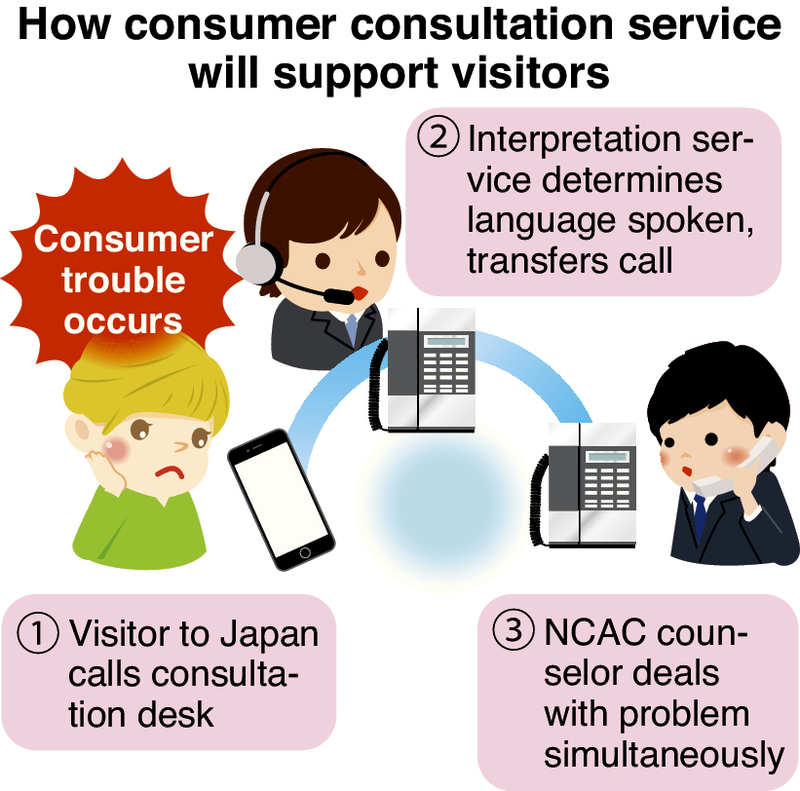
A multilingual telephone consultation service exclusively for foreign visitors will be launched Dec. 3, in a bid to address consumer issues involving travelers from overseas, according to sources.
The new service from the National Consumer Affairs Center of Japan (NCAC) will provide simultaneous interpretation in five languages, analyzing specific cases and seeking to raise the awareness of foreign tourists regarding such issues. This will be Japan's first governmental service desk to handle consumer troubles for foreign visitors.
The NCAC is the administrative agency in charge of consumer affairs research and study.
On Oct. 9, a man from Hong Kong who appeared to be in his 30s spoke volubly in English at a tourist information center in JR Osaka Station, complaining that the parking lot he used at a shopping center the day before was too expensive. The information center's staff asked him what had happened.
The man said he had only paid 1,200 yen (10 dollars) four days before -- regardless of how long he parked -- but was charged 6,500 yen for a little over eight hours on Oct. 8. The staff checked the situation and found that the parking rates were higher on national holidays, including Oct. 8, which was this year's Sports Day.
The man said he didn't know Oct. 8 was a national holiday, but accepted the staff's explanation.
According to the Osaka Convention and Tourism Bureau, tourist information centers handle not just routine operations but also a number of other issues -- including complaints about products and services -- brought up by foreign visitors.
"We handle [these cases] as much as possible, but there's a limit to what we can do at a tourist information center," an official said.
The new multilingual consultation service will allow foreign visitors to dial a specific number to connect to counselors -- who will be standing by in a room at the NCAC -- and interpreters from private companies to which the center has entrusted the service.
Interpretation will be available in English, Chinese, Korean, Thai and Vietnamese. About three counselors will be stationed to handle up to 2,000 inquiries a year.
The cases will be stored in a database for further analysis. Overall trends will be addressed in the center's online outreach activities to raise foreign visitors' awareness in cooperation with such relevant organizations as the Consumer Affairs Agency, the Japan National Tourism Organization and embassies.
The NCAC plans to publicize the establishment of the new telephone line by distributing leaflets at such places as tourist information centers, and may make the service available in more languages in the future.
According to the Japan Tourism Agency, the number of visitors to the country has increased year after year, rising from 5.21 million in 2003 to more than 20 million in 2016. Last year, it reached 28.69 million.
Their spending on goods and services has also been growing, standing at about 4.4162 trillion yen last year, up 17.8 percent from 2016.
This situation has been accompanied by a series of problems relating to such activities as shopping, staying at minpaku private lodgings and using rental car services. However, the central government has yet to fully ascertain the situation.
Since last fiscal year, the NCAC has interviewed local consumer centers, tourist information centers, police and large department stores and found that they have received many complaints involving consumer troubles from foreign visitors. Examples included a restaurant charging for otoshi appetizers, and the key for a minpaku private accommodation facility not being in the place where it was supposed to be picked up.
The NCAC believes some foreign tourists failed to lodge complaints due to their inability to speak Japanese and lack of knowledge about where to address their problems, and that many of the cases could have been resolved if the tourists had been given enough information.
In light of the upcoming 2019 Rugby World Cup and the 2020 Tokyo Olympics and Paralympics, the NCAC decided it was necessary to set up a special section to correctly ascertain the current state of affairs and provide consultation services.
"In addition to solving [foreign visitors'] problems, we'd also like to provide information to keep them from encountering problems in the first place," an NCAC official said.
Read more from The Japan News at https://japannews.yomiuri.co.jp/







